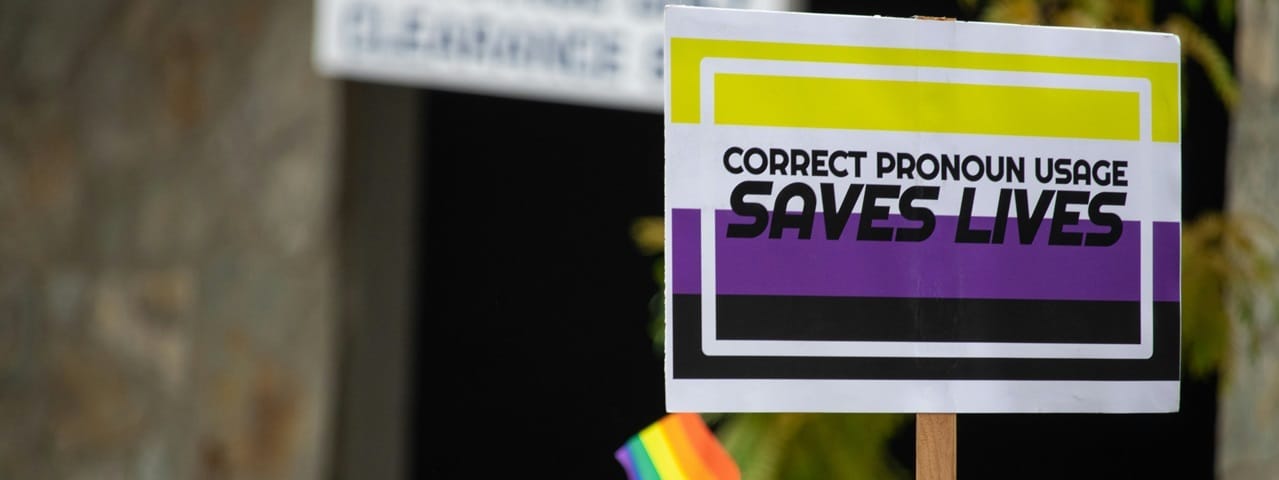What else but preferred pronouns, again?
Speaking into a poisoned linguistic environment, and necessary compromise
Some readers of last week’s newsletter made thoughtful points about the importance of sex-based language, for which many thanks. It inspired me to think harder, which is always good! It’s so much more enjoyable, and useful, to talk with and to people who are in good faith and not stuck on broadcast mode, which Twitter encourages (I certainly work on broadcast mode there, though I hope I’m not in bad faith).
If you are not a subscriber to my weekly newsletter, you might like to sign up for free updates. I hope that in the future you might consider subscribing.
One reader raised Janice Turner saying that her reason for calling Debbie Hayton “she” was “respect”. I can see why that rankles. It seems like “nice transwomen” get called she, and then that “respect” gets stripped from them if they do something awful like commit rape. But I think we shouldn’t place too much weight on a single word. I hear this as Janice simply saying “I do it to be polite.” And people do all sorts of things to be polite.
In last week’s issue I said the only situation I could think of where I would still use preferred pronouns would be if I’d invited a trans-identified person into my home. I rate the obligations of hospitality very highly. Two people I spoke to in real life told me what their own exceptions are, and in both cases I think they’re right, and can imagine myself doing the same.
One is when trying to get through to gender-distressed or indoctrinated young people. They’ve been taught that failing to use people’s preferred pronouns causes extreme mental anguish and perhaps even suicide. They come pre-loaded with the belief that people who don’t accept transgender ideology wholesale are bigoted, evil and hate-filled. If you want to talk to them in a way that has a chance of reaching them you can’t play into their false beliefs. That, I’m afraid, means going beyond simply avoiding pronouns; kids are wise to that.
With kids who’ve been indoctrinated and taught that it is virtuous to act as self-righteous bullies towards older relatives, we have to be the adults in the room. I’m beyond angry that people are lying to them, and moreover encouraging them to act like petty dictators in their families. But we can’t fix everything at once, and if we want to get anything into these kids’ heads – to plant seeds like the unfairness of male advantage in female sports, or the sexism of defining “woman” according to affinity with sex stereotypes – then we have to speak with them. And more than that, they have to actually hear what we’re saying. And I’m afraid that means a careful linguistic balancing act.
The other example I was given came from a Californian who is trying to get Democrats to consider that there may be some downside to “gender-affirming” medical care for children. By and large, he can’t even get in the room. And even in his social circles people don’t want to talk to him; ever since it came out that he had concerns about gender affirmation he’s been shunned.
The way he put it really struck me. He said: “They’re afraid I’ll embarrass them by misgendering their non-binary friend.” Well, if making it clear that he won’t “misgender their non-binary friend” is the price of getting to lay some facts before progressive Americans about what is actually happening in gender clinics, I think that’s a price worth paying – even though preferred pronouns are part of what got us here.
We’re speaking into a deeply poisoned linguistic environment, and that’s unfair, but life isn’t fair. And speech codes have always been tilted against people who are oppressed, discriminated against or going against the dominant culture. Their words are always co-opted and constricted. And right now that’s us. There’s no point pretending it isn’t.
For some years now I’ve done writing workshops with professionals, mostly civil servants. And my starting point is that “success” in writing is not about you, the writer, it’s about the audience. If your words don’t land with them you’ve failed. You can’t excuse that failure by saying they “should” have understood you, or that it’s their ignorance or stupidity that stops them understanding, or that it’s unfair that they don’t. It’s your job to work out where they are and what you need to say to get across your message. You can shout all you like, and be as logical and accurate and pure as you like, but if your words don’t bring about the change you want to see in the world you have failed.
I realised, as I continued to think, what was bothering me so much about the repeated use of the phrase “hold the line” to describe insisting on always using sex-based pronouns, and criticising those who don’t: it’s that it’s the wrong metaphor.
That line has long since been breached, and most people are very far away from it, on what all of us here would agree is the wrong side. Indeed, they’re accelerating away from the line. Almost everyone who isn’t actively involved in this fight thinks preferred pronouns are a minor concession, and mere politeness. I think they’re wrong – preferred pronouns have been a huge part of how we got to now – but that doesn’t change the point that we are where we are, and there is no longer a “line to hold”.
What we need to do is move people back towards where we want them to be, and that’s likely to be slow, at different speeds for different people and step by step. We know where we would like the line to be, but we’ll get nowhere by standing on it bellowing at people who are nowhere nearby.
In the past few weeks my Twitter feed turned into nearly 100% pronouns and “Ultras” and “hold the line”, and I couldn’t bear it any more. So last weekend I went through and unfollowed and removed followers who were still going on this topic – not because I think they’re wrong, or bad, or shouldn’t be having this discussion, but because it felt like the only way I could continue to use Twitter. I didn’t want to leave – a step Kathleen Stock and Andrew Doyle have both said they’re taking, and I suspect Janice is taking without actually announcing it.
It wasn’t a quality test or intended as an insult. It’s just that I want to be thinking about important things where we’ve a chance of making progress, like amending the Equality Act, stopping private members’ bills to ban “conversion practices”, getting out the evidence regarding puberty-blockers, the consultation on the draft schools guidance, the For Women Scotland case and the possibility of an appeal to the Supreme Court (granted on Friday). I wanted to see people talking about those things, not people tearing strips off each other about pronouns.
As the periodic blowups in GC-land tend to, Pronoungate wandered off into another neuralgic issue, namely whether people with anonymous accounts are somehow inferior. (This because many of the people criticising Janice, Andrew and others were anonymous accounts.) I’m so in favour of anonymous accounts that I’ve even gone to the bother of responding to a government consultation about tackling online hate in which I disagreed that ending anonymity online would help.
But here, too, I think there are interesting points that sometimes get lost. First, anons aren’t the only badly behaved people on Twitter – think of Owen Jones and India Willoughby. In the past few weeks, we’ve seen this again. Some of the nastiest responses to Janice, Andrew and indeed me have been from named people – including people I have met in person.
One woman I’ve met several times called me a “Vichy feminist” for saying that piling on Janice was unstrategic and unfair. She’s welcome to disagree with me, but this is just stupid. When it comes to our (shared) stated goals, I’ve achieved a hell of a lot more than her; in fact, I don’t think she achieves anything – anything positive, that is. She’s very good at muddying the legal waters and pissing off potential allies.
I wonder about people like her: have they ever held down a job? Do they know what it takes to work with a wide variety of people who don’t believe the same things as you, and who can be stupid, irritating, bad-tempered, unreasonable and so on (like everyone, on occasion)? Have they had any experience of swallowing their disagreement because the boss calls the shots, or of making nice to customers when those customers are total wankers?
And do they have any idea what it takes to get legislative change? I sometimes feel genuinely exhausted at the thought. It took 15 years between Section 28 becoming law and being repealed, and that was a single clause consisting of a couple of hundred words in a single law, and which had no effect on anything else. Getting the muddle over sex and gender in law will be a thousand times more difficult, since it spreads over all sorts of laws, and since it has many motive forces and many constituencies with a vested interest in blocking solutions.
The other side of the anonymous v. real-name accounts argument is that people have often got good reason to be anonymous online. I follow and interact with many anonymous accounts, and know quite a lot of them in real life ( people come up to me at events and tell me that they’re “such and such from Twitter”). I have met people who are government lawyers and academics, who provide fantastic insights that they would otherwise be unable to share.
I know women with anonymous accounts because they fear a violent ex tracking them, and people whose deranged TRA kids stalk them online and would cut them off if they expressed the slightest hint of heresy. And there are many, many people who can’t afford to lose a job but still want to express themselves and chat freely online.
But there’s a point about anonymous accounts that got missed in the whole kerfuffle – and honestly, the bad faith and motivated misreading on Twitter make me unwilling to say it there. It’s this. Underlying all the reasons to have an anonymous account is a single, meta-reason: it’s so that you can say things you want to say without suffering the consequences of being known to have said them.
If you are signed up for free updates or were forwarded this edition of Joyce Activated, and you would like to subscribe, click below.
Again, those consequences may be horrific, and it may be perfectly reasonable to seek to speak while avoiding them! My point is simply that if you have an anonymous account, that is proof that you understand a person may have things they urgently want to say but won’t if they have to put their name to them.
Now think what that means for people who aren’t anonymous and linguistic landmines – like, say, preferred pronouns. Logically, someone with an anonymous account cannot expect people speaking in their own name to always say exactly what they would say if doing so was free from consequences.




